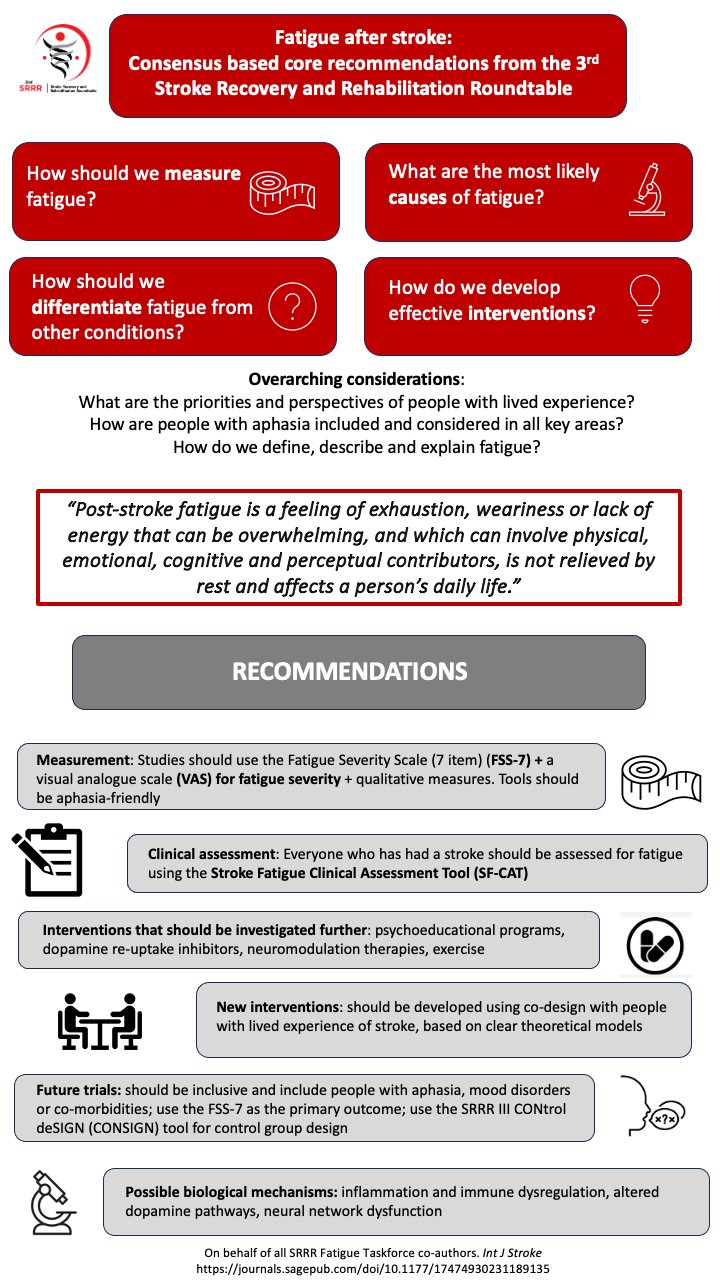So after 13 years you finally decided to do something on fatigue. Good to know there are NO leaders anywhere in stroke! It would be great if you could at least factually pin down the rate of occurrence! Proof of massive incompetency in all of stroke!
My doctor just said I needed to get more cardiovascularly fit. He never tested me on that. 3 years post stroke at a physical I had a
resting heart rate of 54 at age 53, level of an athlete. That doctor asked
what exercises I was doing, 'I've done no exercises for the past 3
years'. That fitness did nothing to stop my fatigue.
post stroke fatigue (25 posts to January 2018)
mental fatigue (4 posts to December 2012)
70% stroke fatigue (15posts to April 2017)
40% fatigue (9 posts to September 2017)
50% stroke fatigue (13 posts to March 2017)
cognitive fatigue (1 post to September 2017)
fatigue (149 posts to September 2010)
A roadmap for research in post-stroke fatigue: Consensus-based core recommendations from the third Stroke Recovery and Rehabilitation Roundtable
Abstract
Rationale:
Fatigue
affects almost half of all people living with stroke. Stroke survivors
rank understanding fatigue and how to reduce it as one of the highest
research priorities.
Methods:
We
convened an interdisciplinary, international group of clinical and
pre-clinical researchers and lived experience experts. We identified
four priority areas: (1) best measurement tools for research, (2)
clinical identification of fatigue and potentially modifiable causes,
(3) promising interventions and recommendations for future trials, and
(4) possible biological mechanisms of fatigue. Cross-cutting themes were
aphasia and the voice of people with lived experience. Working parties
were formed and structured consensus building processes were followed.
Results:
We
present 20 recommendations covering outcome measures for research,
development, and testing of new interventions and priority areas for
future research on the biology of post-stroke fatigue. We developed and
recommend the use of the Stroke Fatigue Clinical Assessment Tool.
Conclusions:
By
synthesizing current knowledge in post-stroke fatigue across clinical
and pre-clinical fields, our work provides a roadmap for future research
into post-stroke fatigue.

Introduction
One in two stroke survivors experience post-stroke fatigue (pooled prevalence estimate 47% (95% CI = 43–50%)).1
Fatigue is a significant and disabling condition in its own right and
is a significant barrier to engaging in rehabilitation and other
activities that promote recovery. Despite its prevalence and impact, a
recent systematic review of 200 stroke clinical guidelines found no
strong recommendations for fatigue prevention or management.2 Fatigue is a critical unmet need which stroke survivors identify as a high-priority research area.3
Therefore, the International Stroke Recovery and Research Alliance
selected post-stroke fatigue as a focus topic of their 3rd Stroke
Recovery and Rehabilitation Roundtable (SRRR).
Post-stroke
fatigue is not merely “tiredness,” nor simply physical deconditioning;
some people have post-stroke fatigue despite high fitness levels.4
Post-stroke fatigue is not always associated with effort, nor always
relieved by rest. Superficially, fatigue can seem like depression or
apathy, and it may co-present with both, but is distinct. For the
purposes of this work, we undertook a process of literature reviews,
expert consensus, and engagement with people with lived experience of
stroke to define to define post-stroke fatigue as:
. . . a feeling of exhaustion, weariness or lack of energy that can be overwhelming, and which can involve physical, emotional, cognitive and perceptual contributors, which is not relieved by rest and affects a person’s daily life.
Despite
the high prevalence and burden of post-stroke fatigue, research is
limited. Cohorts and assessment tools vary, making pooling data and
systematic analysis difficult. Intervention trials are mostly
underpowered and inconclusive. Few studies include participants with a
speech-language disorder, and fewer have explored the relationship
between fatigue and aphasia. Yet some hypothesize a bidirectional
relationship5 given the large effort required to understand and/or produce language.
Clearly, post-stroke fatigue is a multi-faceted condition. An abundance of biopsychosocial factors are associated with fatigue,6
but causal relationships remain unclear, and there is overlap between
depression and fatigue. Fatigue may predispose the development of
depression, and fatigue can be a symptom of depression,7 but the selective efficacy of fluoxetine on depression and not fatigue8
suggests that they can be distinct. Fatigue likely hampers engagement
in productive and meaningful activities, and elevates risk of social
isolation and its secondary effects.
The
overarching aim of this Roundtable was to bring together current
knowledge of post-stroke fatigue based on best available evidence from
multidisciplinary perspectives (clinical, pre-clinical, and lived
experience), identify key knowledge gaps, and provide a roadmap for
future research.
More at link.
No comments:
Post a Comment